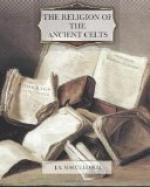The personality of Casswallawn is lost in that of the historic Cassivellaunus, but in a reference to him in the Triads where, with Caradawc and Gweirydd, he bears the title “war king,” we may see a glimpse of his divine character, that of a god of war, invisibly leading on armies to battle, and as such embodied in great chiefs who bore his name.[407] Nynnyaw appears in Geoffrey’s pages as Nennius, who dies of wounds inflicted by Caesar, to the great grief of Cassivellaunus.[408]
The theory that Lludd Llaw Ereint or Lodens Lamargentios represents Nodens (Nuada) L[=a]margentios, the change being the result of alliteration, has been contested,[409] while if the Welsh Lludd and Nudd were identical it is strange that they should have become distinct personalities, Gwyn, son of Nudd, being the lover of Creiddylad, daughter of Lludd,[410] unless in some earlier myth their love was that of brother and sister. Lludd is also confused or is identical with Llyr, just as the Irish Ler is with Alloid. He is probably the son of Beli who, in the tale of Lludd and Llevelys, by the advice of Llevelys rids his country of three plagues.[411] These are, first, the Coranians who hear every whisper, and whom he destroys by throwing over them water in which certain insects given him by Levelys have been bruised. The second is a shriek on May-eve which makes land and water barren, and is caused by a dragon which attacks the dragon of the land. These Lludd captures and imprisons at Dinas Emreis, where they afterwards cause trouble to Vortigern at the building of his castle. The third is that of the disappearance of a year’s supply of food by a magician, who lulls every one to sleep and who is captured by Lludd. Though the Coranians appear in the Triads as a hostile tribe,[412] they may have been a supernatural folk, since their name is perhaps derived from cor, “dwarf,” and they are now regarded as mischievous fairies.[413] They may thus be analogous to the Fomorians, and their story, like that of the dragon and the magician who produce blight and loss of food, may be based on older myth or ritual embodying the belief in powers hostile to fertility, though it is not clear why those powers should be most active on May-day. But this may be a misunderstanding, and the dragons are overcome on May-eve. The references in the tale to Lludd’s generosity and liberality in giving food may reflect his function as a god of growth, but, like other euhemerised gods, he is also called a mighty warrior, and is said to have rebuilt the walls of Caer Ludd (London), his name still surviving in “Ludgate Hill,” where he was buried.[414] This legend doubtless points to some ancient cult of Lludd at this spot.




